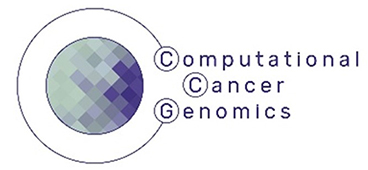
Starting date: July 2021
Work Programme
Leveraging state-of-the-art technologies and innovative statistical and computational methods, previously applied to rare cancers, the Computational Cancer Genomics Team (CCG) aims to understand the rapid progression of common cancers with very poor survival, including lung cancer and pancreatic cancer, as well as cancers identified as being of interest by the G7 Cancer international partnership, such as oesophageal cancer. By addressing critical questions related to cancer initiation and progression, CCG strives to advance the understanding of these lethal diseases and provide insights for prevention and early detection.
To achieve its aim, CCG follows different approaches:
- performing integrative multi-omics molecular analyses of large biorepositories with good quality of samples and detailed pathological, clinical, and epidemiological annotations;
- integrating big data generated from multiple large-scale genomics initiatives to expedite the translation of this research to the classification of tumours;
- reviewing and identifying new morphological characteristics using image-based deep learning and integrating them with the molecular data; and
- using state-of-the-art in vitro organoid models to study cancer initiation and progression (through external collaborators).
CCG is strongly committed to open science and makes available all the resources needed to reproduce the analyses, including raw and processed data, interactive computational notebooks, user-friendly tumour maps that anyone can explore in a web browser, and bioinformatics pipelines.
Current cancers of interest and studies led by CCG:
- lung neuroendocrine tumours (lungNENomics)
- small cell lung cancer (SPHERE)
- pancreatic cancer (GENESIS)
- malignant pleural mesothelioma (MESOMICS).
Team Composition
Team Leaders: Dr Lynnette Fernandez-Cuesta and Dr Matthieu Foll, Genomic Epidemiology Branch (GEM), IARC
Emails: FernandezCuestaL@iarc.who.int; FollM@iarc.who.int
Team members:
Dr Nicolas Alcala (Scientist, GEM)
Dr Alexandra Sexton-Oates (Scientist, GEM)
Dr Catherine Voegele (Bioinformatician, GEM)
Dr Lisa Bonheme (Postdoctoral Scientist, GEM)
Ms Gabrielle Drevet (Doctoral Student, GEM)
Ms Laurane Mangé (Doctoral Student, GEM)
Ms Yuliya Lim (Doctoral Student, GEM)
Ms Lipika Kalson (Visitor from Medical University of Graz, Austria)
Key networks: European Neuroendocrine Tumor Society (ENETS), International Association for the Study of Lung Cancer (IASLC), European Reference Network on Rare Adult Solid Cancers (EURACAN), LYRICAN+, COALA
Key funding: Neuroendocrine Tumor Research Foundation (NETRF), United States Department of Defense (DOD), Worldwide Cancer Research (WCR), Institut national du Cancer (INCa), Ligue nationale contre le Cancer (LNCC), Danish Cancer Society (DCS), National Institutes of Health (NIH), Stanford University, Agence nationale de la Recherche (ANR)
Key publications
- Mathian É, Drouet Y, Sexton-Oates A, Papotti MG, Pelosi G, Vignaud JM, et al. (2024). Assessment of the current and emerging criteria for the histopathological classification of lung neuroendocrine tumours in the lungNENomics project. ESMO Open. 9(6):103591. https://doi.org/10.1016/j.esmoop.2024.103591 PMID:38878324
- Alcala N, Voegele C, Mangiante L, Sexton-Oates A, Clevers H, Fernandez-Cuesta L, et al. (2024). Multi-omic dataset of patient-derived tumor organoids of neuroendocrine neoplasms. Gigascience. 13:giae008. https://doi.org/10.1093/gigascience/giae008 PMID:38451475
- Dayton TL, Alcala N, Moonen L, den Hartigh L, Geurts V, Mangiante L, et al. (2023). Druggable growth dependencies and tumor evolution analysis in patient-derived organoids of neuroendocrine neoplasms from multiple body sites. Cancer Cell. 41(12):2083–2099.e9. https://doi.org/10.1016/j.ccell.2023.11.007 PMID:38086335
- Mangiante L, Alcala N, Sexton-Oates A, Di Genova A, Gonzalez-Perez A, Khandekar A, et al. (2023). Multiomic analysis of malignant pleural mesothelioma identifies molecular axes and specialized tumor profiles driving intertumor heterogeneity. Nat Genet. 55(4):607–18. https://doi.org/10.1038/s41588-023-01321-1 PMID:36928603
- Mathian E, Liu H, Fernandez-Cuesta L, Samaras D, Foll M, Chen L (2023). HaloAE: a local transformer auto-encoder for anomaly detection and localization based on HaloNet. In: Radeva P, Farinella GM, Bouatouch K, editors. Proceedings of the 18th International Joint Conference on Computer Vision, Imaging and Computer Graphics Theory and Applications (VISIGRAPP 2023), Lisbon, Portugal, 19–21 February 2023. Volume 5: VISAPP. SciTePress; pp. 325–337. https://doi.org/10.5220/0011865900003417
- Di Genova A, Mangiante L, Sexton-Oates A, Voegele C, Fernandez-Cuesta L, Alcala N, et al. (2022). A molecular phenotypic map of malignant pleural mesothelioma. Gigascience. 12:giac128. https://doi.org/10.1093/gigascience/giac128 PMID:36705549
- Gabriel AAG, Mathian E, Mangiante L, Voegele C, Cahais V, Ghantous A, et al. (2020). A molecular map of lung neuroendocrine neoplasms. Gigascience. 9(11):giaa112. https://doi.org/10.1093/gigascience/giaa112 PMID:33124659
- Alcala N, Mangiante L, Le-Stang N, Gustafson CE, Boyault S, Damiola F, et al. (2019). Redefining malignant pleural mesothelioma types as a continuum uncovers immune-vascular interactions. EBioMedicine. 48:191–202. https://doi.org/10.1016/j.ebiom.2019.09.003 PMID:31648983
- Alcala N, Leblay N, Gabriel AAG, Mangiante L, Hervas D, Giffon T, et al. (2019). Integrative and comparative genomic analyses identify clinically relevant pulmonary carcinoid groups and unveil the supra-carcinoids. Nat Commun. 10(1):3407. https://doi.org/10.1038/s41467-019-11276-9 PMID:31431620
- Derks JL, Leblay N, Thunnissen E, van Suylen RJ, den Bakker M, Groen HJM, et al.; PALGA-Group (2018). Molecular subtypes of pulmonary large-cell neuroendocrine carcinoma predict chemotherapy treatment outcome. Clin Cancer Res. 24(1):33–42. https://doi.org/10.1158/1078-0432.CCR-17-1921 PMID:29066508


